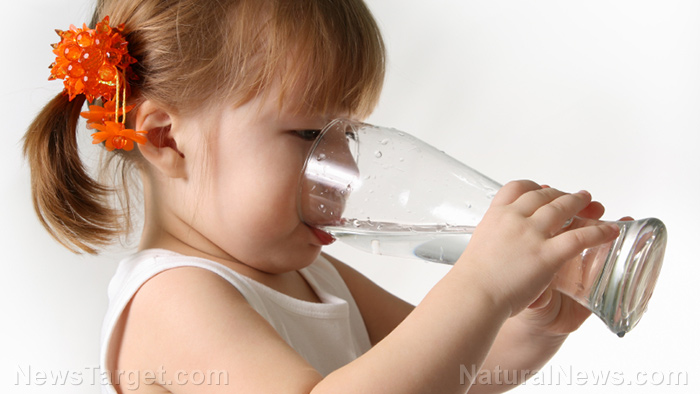Dehydrated children: Kids are drinking about one quarter of the water they should be, according to new study
10/28/2017 / By Janine Acero

Children are drinking less water than what is recommended, with some even going through an entire school day with just one glass of water consumed, a new study reveals.
Guidelines suggest that four- to eight-year-olds should have five glasses (one liter) of water a day; seven to eight glasses (1.5 liters) for nine- to 13-year-old children; and eight to 11 glasses for 14 to 18 years – but the average child is said to be drinking less than two glasses a day. A further 32 percent go through the entire school day having just one glass of water.
According to an article on the DailyMail, a survey of 2,000 parents conducted by Chilean Easy Peel Orange revealed that seven in 10 parents claimed their child’s school doesn’t have a policy in place for proper hydration of students during their six-hour classes; six in 10 parents thought their child had a drink during break time at school; four in 10 parents said their kids are allowed to have water during class time; and three in 10 parents blame the “water-only” policy of schools for discouraging their children to drink more popular fluids like juices. One in 20 parents also admitted that most days their child drinks absolutely nothing between the hours of nine and three.
Schools have “water-only” policies to discourage the consumption of high-sugar drinks such as juices and fizzy drinks. Too much consumption of such fluids is one of the main drivers of childhood obesity – which leads to a wide range of adverse health conditions – as well as tooth decay. Dentists have long advised everyone to avoid drinks with pH levels more acidic than 5.5. (Related: Why Soft Drinks Contribute to Obesity.)
Mother Nature's micronutrient secret: Organic Broccoli Sprout Capsules now available, delivering 280mg of high-density nutrition, including the extraordinary "sulforaphane" and "glucosinolate" nutrients found only in cruciferous healing foods. Every lot laboratory tested. See availability here.
However, some experts even recommend that if children don’t like the taste of plain water, they should try adding no-added-sugar fruit juice for flavor.
Convincing kids to drink
A third of the parents from the survey admitted that they struggled to have their child drink fluids in general, which leads to worrying symptoms of dehydration – mild headaches, dizziness, and exhaustion. Nearly half of the parents even believe their child’s concentration at school becomes impaired due to dehydration.
Because of this, parents have come up with all sorts of techniques to get their kids to drink more, such as sneaking juice into their school water bottles (18 percent of the respondents) and letting them have hot chocolate at bedtime (20 percent). Others bargain their dessert for a drink and allow fizzy drinks at dinner.
According to registered public health nutritionist Dr Emma Derbyshire: “European advice is that about 70-80 percent of water as specified in the guidelines should come from beverages and the remaining 20-30 percent originating from food sources.
“Many people forget that fluids can come from foods as well as drinks.
“Swapping break, lunchbox or after-school snacks for fruits such as oranges is a great way to top up kids fluid intake.
“It is very important that we embed healthy hydration habits from early on.”
Alternatives to water
While drinking clean, crisp water is the best way to keep your kids (and yourself) hydrated, there are other fluids that children can drink that may be healthy for them. These are:
- Milk – This is a great source of nutrients, especially protein and calcium. The best choice for children would be reduced-fat milks, or unsweetened, calcium-fortified dairy alternatives such as yogurt. Milky drinks containing added sugars such as milkshakes, hot chocolate, and malted drinks should only be given to children occasionally.
- Fruit and vegetable juices and smoothies – Fruits and vegetables provide some vitamins and minerals, and some can contain fiber. However, some can also contain free sugars and can be acidic so it’s recommended to limit them to one small glass (150ml) a day and to keep them to mealtimes. They can be diluted with water to reduce acidity and sugar content.
Your child deserves the best nutrition. For more articles like this, along with some helpful guides on how to enhance health, visit Nutrients.news today.
Sources include:
Tagged Under: children's health, dehydration, drinking water, hydration, juices, school policies, schools, soda, soft drinks, water, water consumption, water intake, water-only policy




















